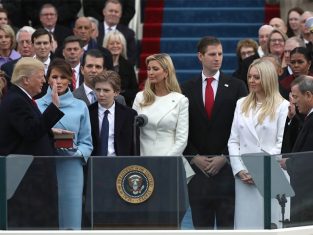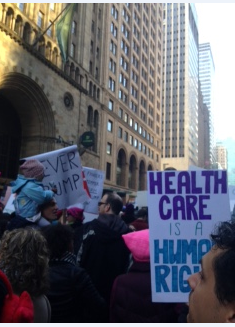Related Posts
Inauguration
Donald Trump was inaugurated as the 45th president of the United States on Jan. 20. He used his inauguration speech to inform our citizens and other countries that from now on, he plans to put “America first.”

U.S. President Donald Trump, left, with his family at his side, takes the oath of office from U.S. Supreme Court Chief Justice John Roberts, far right. Photo courtesy of Reuters/Carlos Barria.
Doing this, he says, will require that “Every decision on trade, on taxes, on immigration, on foreign affairs will be made to benefit American workers and American families…. We will bring back our jobs…our borders…our wealth…our dreams.”
Just that morning, I had been reading Joseph Lelyveld’s book about Franklin Roosevelt’s final campaign and year, His Final Battle: The Last Months of Franklin Roosevelt.
Having led the U.S. through the difficult days of World War II, President Roosevelt had a different perspective on the future of the world, and it’s one worth contemplating.
“The very fact that we now are at work on the organization of the peace proves that the great nations are committed to trust each other,” Roosevelt said. “Put this proposition anyway you want, it is bound to come out the same way. We either work with the other great nations, or we might someday have to fight them.”
Roosevelt went on to say there would be no lasting peace if we did not pursue collaboration.
The world has changed a lot since then. Still, although I am no foreign policy expert, Roosevelt’s logic seems impeccable. All we need do is extrapolate from the ways we must collaborate within families, university departments, communities, organizations and states. We need our friends.
Weekend marches
I did not march over the weekend, but I got a lot of emails from people who did. Marching for causes is an important outlet to convey how one feels about events, policies and leaders. Peaceful marches lend a voice to people who might otherwise be perceived as anecdotes or anomalies.
 This photograph, of a sign that reads “Health care is a human right,” was taken by my brother-in-law George Schott, who participated in the New York City women’s march with my sister Liz Rimer. The sign reflects what so many in public health believe about health care.
This photograph, of a sign that reads “Health care is a human right,” was taken by my brother-in-law George Schott, who participated in the New York City women’s march with my sister Liz Rimer. The sign reflects what so many in public health believe about health care.
Having been a cancer researcher for many years, I know that insurance is an important marker that determines whether people seek care for symptoms and whether they get cancer screenings that would detect problems early. We can improve the Affordable Care Act, but repealing without replacement would leave 18 million people in this country at risk.
That would be a huge setback.
Barbara
